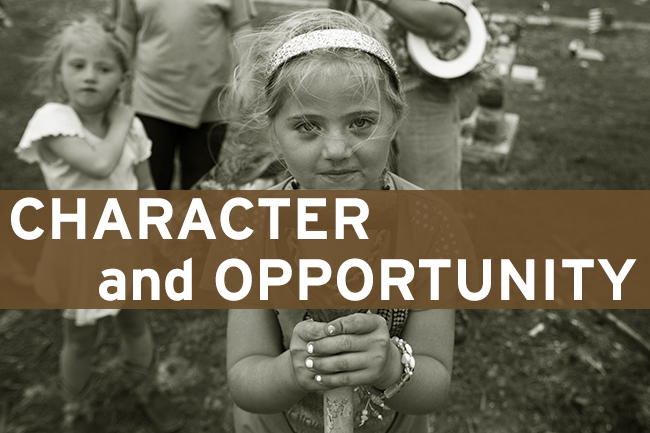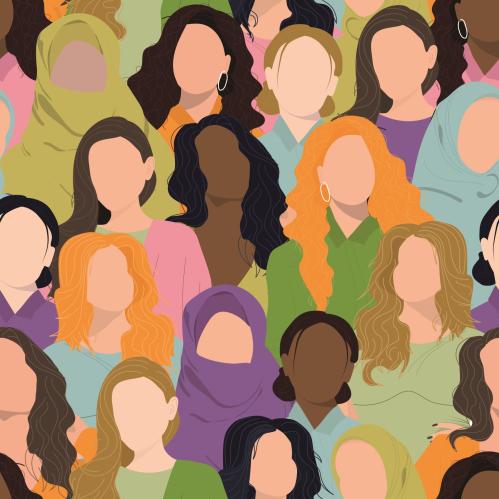In this essay from the Center on Children and Families’ Essay Series on Character and Opportunity, Martin Seligman says that neither good character nor opportunity on their own will amount to much for an individual—they must be accompanied by optimism and hope, the bulwarks of a robust future-mindedness.
The standard view of today’s social reformers is that building character plus building opportunity will break the transmission of poverty from one generation to the next. I think this view, while laudable and a big improvement over the failed strategy of merely building opportunity, is still seriously incomplete. The missing link is that good character can take advantage of opportunity only by free will, and free will only works through future-mindedness. This view sounds quaint to twenty-first century ears and so is in need of a history and a justification.
Why did science give up the notion of free will? Pierre-Simon Laplace (1749-1827), a French mathematician of the Enlightenment, postulated that if we knew the position and momentum of every particle in the universe at one instant only, we could then predict the entire future of the universe as well as postdict the entire past. When the deterministic claims of Darwin for biology, Marx for sociology and politics, and Freud for psychology are hammered on to Laplace’s superstructure, this makes for a pretty imposing edifice – an edifice that is a secular version of the Calvinist doctrine of predestination and just as pointedly renders any belief in human choice nonsensical. Is it any wonder that so many educated people of the twentieth and twenty-first centuries began to believe that they were prisoners of their past, doomed to be frog-marched into their predestined futures by the accidents of their environment and their personal histories?
Actually it is. First, because the argument is much looser than it appears, and second because Laplace faced venerable intellectual forces arrayed on the opposing side. The nineteenth century American mind did not think much of historical determinism. Quite the contrary.
The educated nineteenth century American mind believed deeply, and for reasons not at all frivolous, in two intimately related psychological doctrines: free will and character. It was the first doctrine, free will, and all its buttresses that were arrayed against Laplace and his allies. The modern history of free will begins with the liberal Dutch Protestant Jacob Arminius (1560- 1609). In opposition to Luther and Calvin, Arminius claims that humans have free will and can participate in their own election to grace. This was dubbed the “Arminian Heresy” since grace was supposed to come freely only from God. The heresy then became widespread through the charismatic, evangelical preaching of John Wesley (1703-1791).
The English founder of Methodism, Wesley preached that humans have free will and using free will, each of us can actively participate in attaining their own salvation by doing good works. Wesley’s stunning sermons, heard through the cities, towns, and villages of England, Wales, Northern Ireland, and in the American Colonies, made Methodism a strong and popular religion by the early part of the nineteenth century. Free will entered popular American consciousness, and almost all forms of American Christianity – even Lutheran and Calvinist – came to embrace it. Ordinary people no longer saw themselves as passive vessels waiting to be filled with grace. Ordinary human life could be improved. Ordinary people could better themselves. The first half of the nineteenth century became the great age of social reform – the second great awakening. The Evangelical religion of the American frontier was intensely individualistic. Prayer meetings climaxed with the drama of the choice of Christ.
There was no better soil than nineteenth century America for this doctrine to root and grow and flower. Rugged individualism, the idea that all men were created equal, the endless frontier along which the waves of immigrants could find freedom and riches, the institution of universal schooling, the idea that criminals could be rehabilitated, the freeing of the slaves, the drive to women’s suffrage, and the idealization of the entrepreneur, are all manifestations of how seriously the nineteenth century mind took free will – before Darwin, Marx, and Freud threw cold water on it – and how little it cared for the idea that we are prisoners of the past.
This led to an uncomfortable standoff. On the one hand, the religious and political traditions of America embraced free will and everyday experience seemed to display it in hundreds of small ways. On the other hand the bulky edifice of science seems to demand that you give up the notion. So by the end of the 20th century, educated Americans were talking out of both sides of their mouths about freedom and choice. On the one hand, free will is integral to political discourse (e.g., “the will of the people,” “responsibility” “I will return character to the White House”) and to ordinary discourse (e.g., “Would you mind putting your cigarette out?” “Would you rather go to the movies or watch television?”). On the other hand, tough-minded scientific argument excludes it. This exclusion has crept into legal decisions (“mitigating circumstances,” “not guilty by reason of insanity”), and most importantly into the way most educated people think about their own past.
Can hard determinism be overthrown? After all, Laplacian determinism failed utterly for Freudians, was too general to be at all predictive for Darwinians, and as for Marx, the only remaining home for historical inevitability after the fall of Eastern Europe is in the English departments of a few elite American universities. The philosophical arguments for Laplace’s dictum are, however, less easily disposed of than the empirical claims of Freud and Marx. This is not the place to review the long, picky arguments about hard determinism, soft determinism, compatibilism and free will. For now, I will simply direct attention to recent work by Chandra Sripada (2014), work that is a breath of fresh air as it discusses an aspect of free will that has been so far almost entirely neglected.
Paraphrasing liberally from Sripada’s discussion, consider the question of what makes a Ferrari fast, what is special or distinctive that makes a Ferrari speedier than other cars. A proper answer must surely say something about the Ferrari’s engine, and in particular its size or power or its unique engineering. The philosophical question of free will is similar: What is the distinctive mark that makes humans, presumably alone in the animal world, free?
Sripada contends that the distinctive mark of free will is not, as is usually claimed, any properties of our decisions or our actions; it is remarkable how much decisional machinery we share with simpler creatures. Rather, it is to be found in our imagination – it consists in our potent abilities to imaginatively construct and evaluate options. These abilities are in turn intimately linked to time horizons; a sufficiently long horizon enables the building of complex plans of action that unfold over months, years, decades, even generations. If a person can only think about the actions that can be done in the present moment, his set of options is highly constrained. Once the future is fully brought in, the space of options expands spectacularly; there are countless plans he might construct, projects he might pursue, lives he might lead, persons he might elect to be. It is human imagination, our ability to mentally create sets of options of massive size and diversity, that is the engine of freedom.
If Sripada is correct, this makes sense of Banfield’s dictum (1976) that poverty is not a state of the pocket book, but a state of mind – present mindedness. This in turn has important implications for interventions that will break the intergenerational cycle of poverty.
Good character alone will not amount to much. More opportunity alone will not amount to much. They must be accompanied by optimism and hope, the bulwarks of a robust future-mindedness – and there are well-validated interventions that build optimism and hope. We need to develop interventions that expand the latitude of the futures young people imagine, that lengthen the time horizon that young people imagine, and that teach our young people how to dream.



